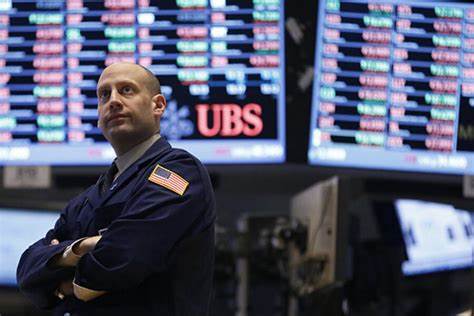U.S. stocks traded marginally lower Thursday, as weak jobs data created more uncertainty over the future path of the Federal Reserve's monetary policy.
At 09:35 ET (13:35 GMT), the Dow Jones Industrial Average fell 20 points, or 0.1%, the S&P 500 dropped 3 points, or 0.1%, and the NASDAQ Composite slipped 13 points, or 0.1%.
More Fed speakers in focus after weak jobs data What the Federal Reserve intends to do with interest rates continues to be the dominant influence driving markets, with a string of Fed officials warning that the central bank could keep rates steady this year denting recent confidence.
There are more officials due in the coming days to provide more information of current thinking, including San Francisco Fed President Mary Daly later Thursday and Chicago Fed President Austan Goolsbee on Friday.
However, data released earlier Thursday showed that the number of Americans filing first-time claims for unemployment benefits was greater than anticipated last week, as initial jobless claims rose to 231,000.
This was the highest mark since August and above economists' expectations of 212,000, in the latest sign of potential cooling in the U.S. labor market.
"This morning’s economic release - unemployment claims – was much weaker than expected," said analysts at Evercore ISI, in a note.
"The unemployment claims suggest slowing jobs growth in May," the investment bank said, adding "a recession signal from unemployment claims is around 300K."
This brings next week's release of consumer price data - a closely-watched gauge of inflation - firmly into focus.
Inflation has largely stalled above the 3% level on an annual basis, at a rate that policymakers regard as still too far above their target to declare the job finished.
This could leave officials with the difficult choice in coming months of how much risk to take with economic growth and the job market for what may only be modest further improvements in the pace of price increases.
Arm offers disappointing guidance despite AI boom On a corporate level, some underwhelming quarterly earnings have also weighed on sentiment.
Arm Holdings (NASDAQ:ARM) stock fell 5% after the chip designer delivered annual revenue guidance that fell short of estimates despite a wave of enterprise spending on artificial intelligence.
Airbnb (NASDAQ:ABNB) stock dropped 7% after the vacation rental company forecast second-quarter revenue below expectations, despite strong demand in regions outside of North America.
On the flip side, trading platform Robinhood (NASDAQ:HOOD) rose over 7% after reporting strong quarterly earnings on higher user figures, while online dating app Bumble (NASDAQ:BMBL) soared 4% after forecasting strong earnings growth.
Oil gains on China trade data Crude prices rose Thursday, boosted by falling U.S. crude inventories as well as upbeat trade data from China, the largest importer of oil in the world.
By 09:35 ET, the U.S. crude futures traded 0.3% higher at $79.22 per barrel, while the Brent contract climbed 0.3% to $83.80 per barrel.
U.S. crude inventories dropped last week by 1.4 million barrels, according to data from the Energy Information Administration - something of a surprise after the industry body American Petroleum Institute indicated earlier this week that inventories grew 0.5 million barrels.













